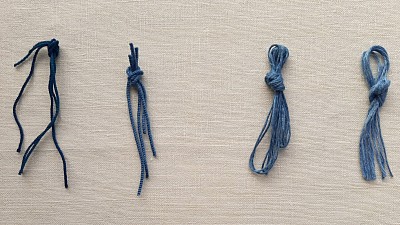Pictures of the Candidates!

Just for fun, here are samples of four of the candidates put forth as tekeleth. To be honest, it is quite difficult to capture a good picture with all of the candidates. There are qualities to each, that different lighting might pick up, but I haven't yet discovered a lighting that works best for all of them at once, to show what I see off camera. I will mention these qualities in the individual pictures below. I also will try to find a better way to capture these colours on camera.
Reuven Prager, of Beged Ivri, contacted me, asking for a sample of my Woad dyeing. In return he sent me samples of the Radzin's Cuttlefish's and Ptil's Murex snail's dyes. He sells the Radzin's Cuttlefish dye.
The Indigo dyed linen sample is from the strings that I ordered from Zipporahreshel. I wanted to see in what ways Woad and Indigo were similar and also different.
Below are two pictures of each candidate; one up close and one even closer with a microscope! Each candidate's pictures are of the exact same sample, just each one closer up. I invite you to click on the pictures for a brighter, clearer image.
Radzin's Cuttlefish dye on Wool
Ptil's Murex Snail dye on Wool
The Ancients' Blue Woad dye on Linen
As I have mentioned above, these particular pictures do not really show up the real life, off camera, colours of the candidates. This sample is dyed very evenly, though it does not appear so. You can see it is evenly dyed in the microscope picture.
Woad seems to vary in different lights, from a deep blue, to a brighter deep blue. I don't know if this applies to any of the other candidates as I do not have them in my home to observe them due to their tamei status. Also the Woad on linen has silver sliver highlights. This picture makes Woad look lifeless, which is the opposite of what I have seen over many years now.
This is Woad under a microscope. Woad is not this bright with the naked eye. You can see it is dyed evenly.
What I find astonishing is that it is almost identical to Ptil's under the microscope! I didn't even notice until I had put them both here. Interesting since they are chemically identical as well, here. However they are dyed onto different mediums; Ptil on wool and Woad on linen. The linen has particle strands that seem to reflect light, giving it silver slivers, while wool seems to absorb light and project an even colour. If you click on and compare the microscope pictures of Ptil and Woad you will see the silvery slivers on Woad dyed linen, while the Ptil's on wool is very evenly coloured.
Zipporahreshel's Indigo
This is a poor likeness of Indigo, which can actually be quite vivid. Additionally, this sample was dyed lightly and unevenly. I do not have any other sample of Indigo to use in it's place. In natural daylight, it is an almost mauve light blue.









